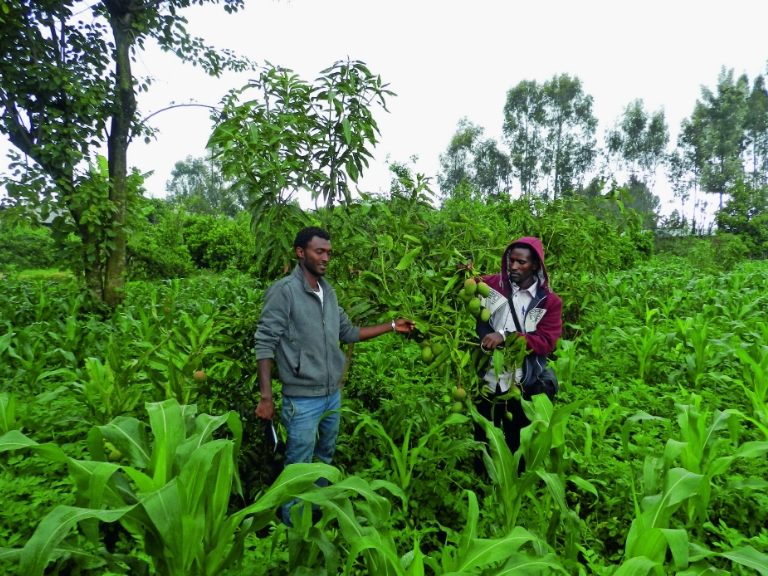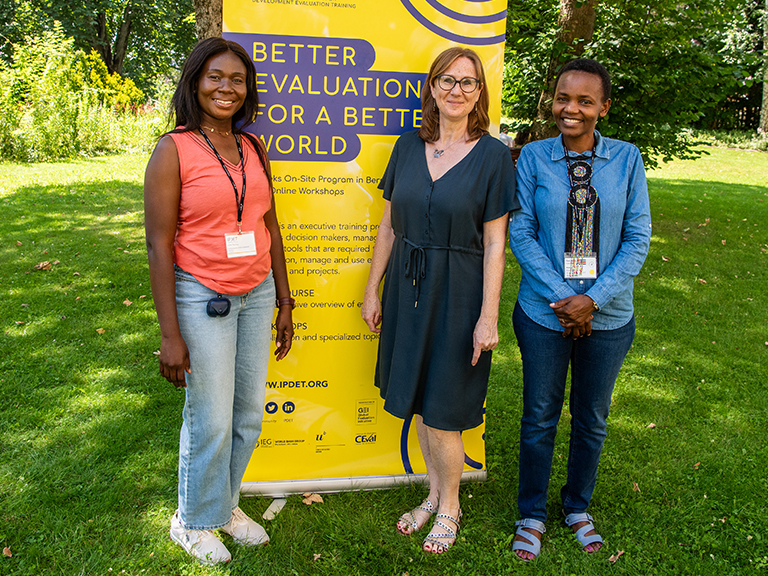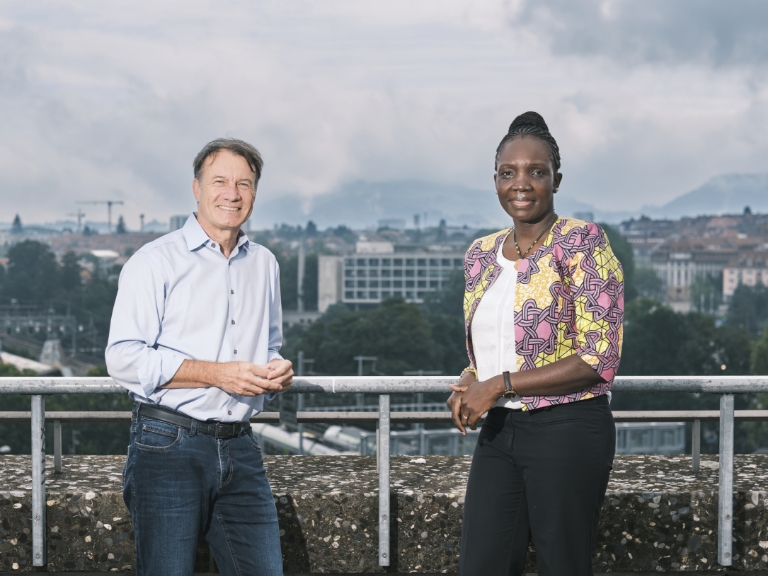In focus
Africa – a continent on the road to self-determination?
Between the colonial past and the economic engine of the future: Africa is somewhere in between. An assessment by Chinwe Ifejika Speranza from the Institute of Geography and Thomas Breu from the Centre for Development and Environment.
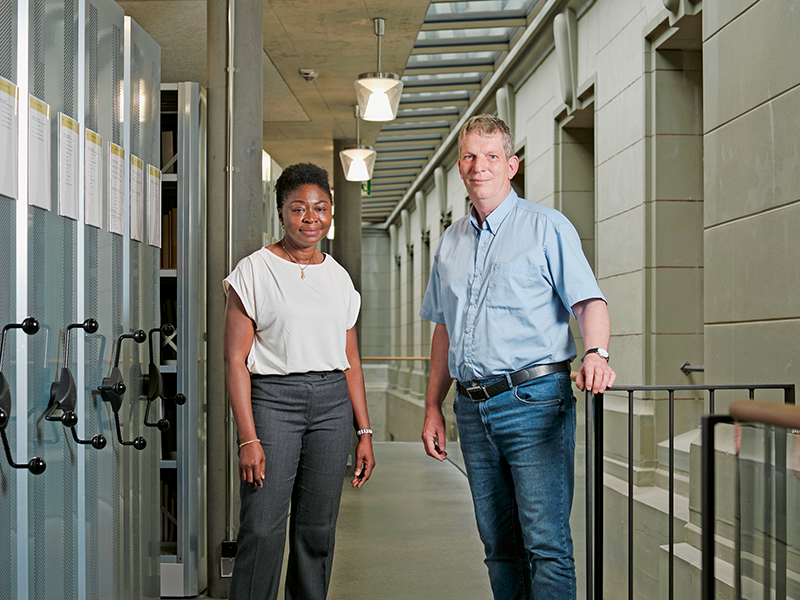
Chinwe Ifejika Speranza: In Africa, there is this openness towards others because there is no other way due to the many cultures. This principle of community, known as “Ubuntu” in southern Africa, embodies this philosophy of life throughout the continent. In many places, colonial history also contained common elements, although its course varied.
Thomas Breu:Positive developments can be observed in many African countries: Civil society is becoming stronger, and the younger generation in particular is showing a growing sense of self-confidence. On the other hand, however, there is a worrying trend. In the course of the geopolitical bloc formation, the young African democracies are increasingly being displaced by autocratic regimes.
Is Africa still struggling with its history?Ifejika Speranza: Yes, definitely. Many things are still complicated today by the colonial past. An example of this is the administration. The state school systems, land rights and so on are shaped by colonial rule. However, the traditional, pre-colonial systems still exist. If I want to buy land, that is done within the modern state system. Depending on where I am, however, I also have to make the same purchase through the traditional system.
“Many things are still complicated today by the colonial past.”
Chinwe Ifejika Speranza
There are two land registers?Ifejika Speranza: So to speak, yes. That of the state and that of the village. These two systems often exist in parallel. Sometimes they are complementary, but usually they act as a barrier to each other.
Despite these challenges, Africa is believed to have great potential, particularly due to its very young population. How can Africa tap into this potential?Ifejika Speranza: Infrastructure is needed. If you don’t have any electricity, you can’t do any programming or work as a mechanic. In many African countries, this limits the possibilities. On the other hand, some African countries are very advanced in terms of technological innovation, such as payment transactions and cell phones. Switzerland is lagging behind with Twint. But foreign investment is lacking. This is due not least to the political framework conditions. Politicians need further training to enable them to improve these conditions. And: Their decisions must be transparent. This would help to increase trust between the different groups.
Breu: In my opinion, we also need to invest in education, not least at university level. And there needs to be freedom from conflict. The economic structure also contributes to this.
What exactly do you mean by that?Breu: Many African economies are one-sided. They are often dependent on exports to global markets, such as agricultural products and mineral resources.
Why is that a problem?Breu: For example, Nigeria’s crude oil exports are so high that it is hindering the development of a differentiated economy that other sectors also benefit from. This can lead to import dependencies. One-sided economies also prevent the development of a middle class, which is extremely important for stability in the event of conflict. This was demonstrated in Kenya in 2008, when violent ethnic conflicts erupted after the controversial presidential election. Kenya’s middle class helped keep the conflict from getting out of control.
But isn’t the differentiation of the economy taking place at least at a regional level? You mentioned advanced tech innovations. And Google and Microsoft have offices in Nairobi.Ifejika Speranza: But in comparison to the raw materials, these still account for a very small proportion. This is likely to remain so for the foreseeable future.
China, for example, invests a lot to secure access to raw materials as well as cheap labor and production conditions – for example, in the form of the railway line between the Ethiopian capital Addis Ababa and Djibouti. Is this a new form of colonialism, or are there opportunities associated with it?Ifejika Speranza: It is the African countries that say: “We want you to build these roads for us, and then you'll get something in return.” In this respect, it’s give and take. On the other hand, I wonder what will happen to these roads or infrastructure, how sustainable they are. If, for example, an infrastructure is imported entirely from China or built on site by Chinese workers, hardly anybody takes the trouble to see whether someone within the country can repair it if something breaks or goes wrong.
Magazine uniFOKUS
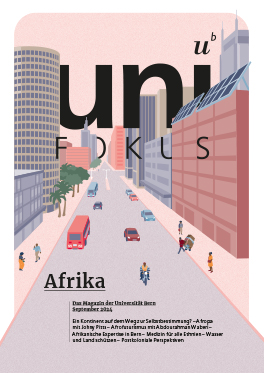
Africa
This article first appeared in uniFOKUS, the University of Bern print magazine. Four times a year, uniFOKUS focuses on one specialist area from different points of view. Current focus topic: Africa
Subscribe to uniFOKUS magazineBreu: Incidentally, China is not the biggest investor in Africa, as people always think, but rather the United Arab Emirates – at least when it comes to direct capital investment. Generally speaking, I find it regrettable that most of these investments are for large-scale infrastructure – such as a six-lane motorway from Mombasa to Nairobi or the railway lines. What is not happening enough, however, are investments that serve social development.
What do you mean by that?Breu: For example, the establishment of markets and value chains that help the population develop products and sell them at fair prices in the region. Or digital applications that would efficiently meet the needs of the labor market for workers with different qualifications. Such forms of investment are needed to strengthen civil society and create a more differentiated economy.
Why aren’t such investments being made?Breu: With the Washington Consensus, i.e. with a series of restructuring programs in the late 1980s, the global community practically paralyzed all investment in such social infrastructures. In my view, the West made massive mistakes in this regard. It imposed a neoliberal system on these states. It was assumed that the trickle-down effect, i.e. the seepage of income growth from top to bottom, would take place and ultimately everyone would benefit from it. But that never happened, and purely profit-oriented or geopolitical-oriented players stepped into the social investment vacuum.
You are also referring to development cooperation. This is currently a contentious issue in Switzerland. The Federal Council has redistributed development funds to the detriment of the Global South, particularly sub-Saharan Africa.Breu: I find this development extremely problematic. As is the fact that Switzerland brings together development cooperation and humanitarian aid. We are one world, and what happens in the Global South also has an impact here. Global challenges, be it the climate, biodiversity, migration or pandemics, can only be solved by working together, beyond national borders.
“There are too few investments that serve social development.”
Thomas Breu
What kind of development cooperation should Switzerland engage in?Ifejika Speranza: The main question should be: What can be done to improve local living conditions? For example, by companies paying fair wages and assuming their responsibility on the ground. If living conditions are improved, many people can stay there.
Breu: In my view, building the knowledge society and strengthening civil society are crucial, so that people can take matters into their own hands. The demand for support in these areas is very high. However, the Swiss National Science Foundation is currently only investing around one percent in research cooperation with the Global South. In addition, development policy stands in contrast to foreign trade policy, which is geared towards the best possible conditions for Swiss companies and hardly demands responsible business practices on the part of corporations. So the two policy areas are not moving in the same direction. I see huge potential in aligning the different policy areas in a coherent way.
What can the University of Bern do?Breu: We should do much more to promote research cooperation with Africa, as provided for in the Initiative Afrique. The main problem in Africa is that there are relatively few trained lecturers and professors. On the other hand, there is a great appetite for and need for education. The universities are almost overrun by students.
About the person
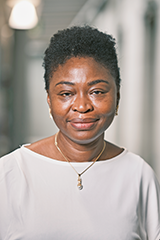
Chinwe Ifejika Speranza
is Professor of Geography and Sustainable Development. She heads the research unit “Land Systems and Sustainable Land Management” at the Institute of Geography (GIUB) of the University of Bern. Her research focuses on sustainable land use and its interactions with ecological processes in Africa, Switzerland and around the world.
Ifejika Speranza: Research should be given greater prominence in African countries. This is particularly decisive for the quality of training – but also for the development of innovations. Some African countries have recognized this and have begun to invest in research.
As we talk about how we can help Africa reach its potential, we are threatening the continent with our way of life. Africa is one of the regions in the world most affected by climate change. Where do we see this today?Ifejika Speranza: For example, in eastern Kenya, where droughts are becoming more severe. And when it rains, there is more flooding. Whether Africa can adapt to climate change depends on how resilient society is – socially and economically. In many places there is no insurance against sickness or crop failure. People are mostly on their own.
The threat is great, although Africa has contributed very little to the climate crisis. How do you assess the “climate debt” of industrialized nations?Ifejika Speranza: The major problem is that there is not enough money. On the one hand, because the promises are higher than what the industrialized countries have paid so far. On the other hand, the calculation methods are difficult. The monetary grading of agriculture in Africa is comparatively low. This means that there is little compensation for losses. But people still suffer. Therefore, other measures or ways must be found to compensate for these losses.
Breu: I see another area that I am more concerned about: that compensation for greenhouse gas emissions from the North may lead to a colonial type of land grab.
For example, through reforestation projects?Breu: Yes, exactly. The land earmarked for this purpose is never really unused. If public goods such as forests are suddenly placed under protection and traditional access for local people is cut off or limited, this could exacerbate poverty. Alongside a few winners, there are also many losers.
About the person
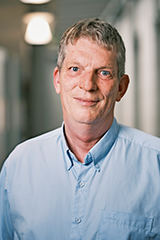
Thomas Breu
is Professor of Sustainable Development and Director of the Centre for Development and Environment (CDE) at the University of Bern. His research focuses on sustainable development in a globalized world with a focus on resource use, particularly in Africa and Southeast Asia.
Ifejika Speranza: It is the state that makes promises, but it is the villages and communities that have to give up the land. This is why traditional and state systems of land ownership need to be brought closer together. And also so that everyone can see who has the decision-making power and who benefits from it. Otherwise, this will lead to conflict.
Will we still be talking about the potential 30 years from now, or will Africa have established itself as a major global player by then?Breu: My hopeful statement would be: Yes, Africa will experience self-determined development that serves society and become a respected partner in the global community.
And the realistic one?Breu: We grow through the consumption of resources. I do not believe that African countries should make the same mistakes, but I doubt that they will be able to eradicate poverty in such a short period of time without consuming significantly more resources themselves. In addition, we need to rethink the way we work together. Unfortunately, the signs around the world are not particularly good.
Ifejika Speranza: There will be areas in which many things work better – some of them already exist, for example in Ghana, where, among other things, investments in education and health have significantly improved living conditions. Then there will be areas which will still have difficulties, but there will be fewer areas than there are at the moment. I see that as a positive thing.
Subscribe to the uniAKTUELL newsletter

Discover stories about the research at the University of Bern and the people behind it.
